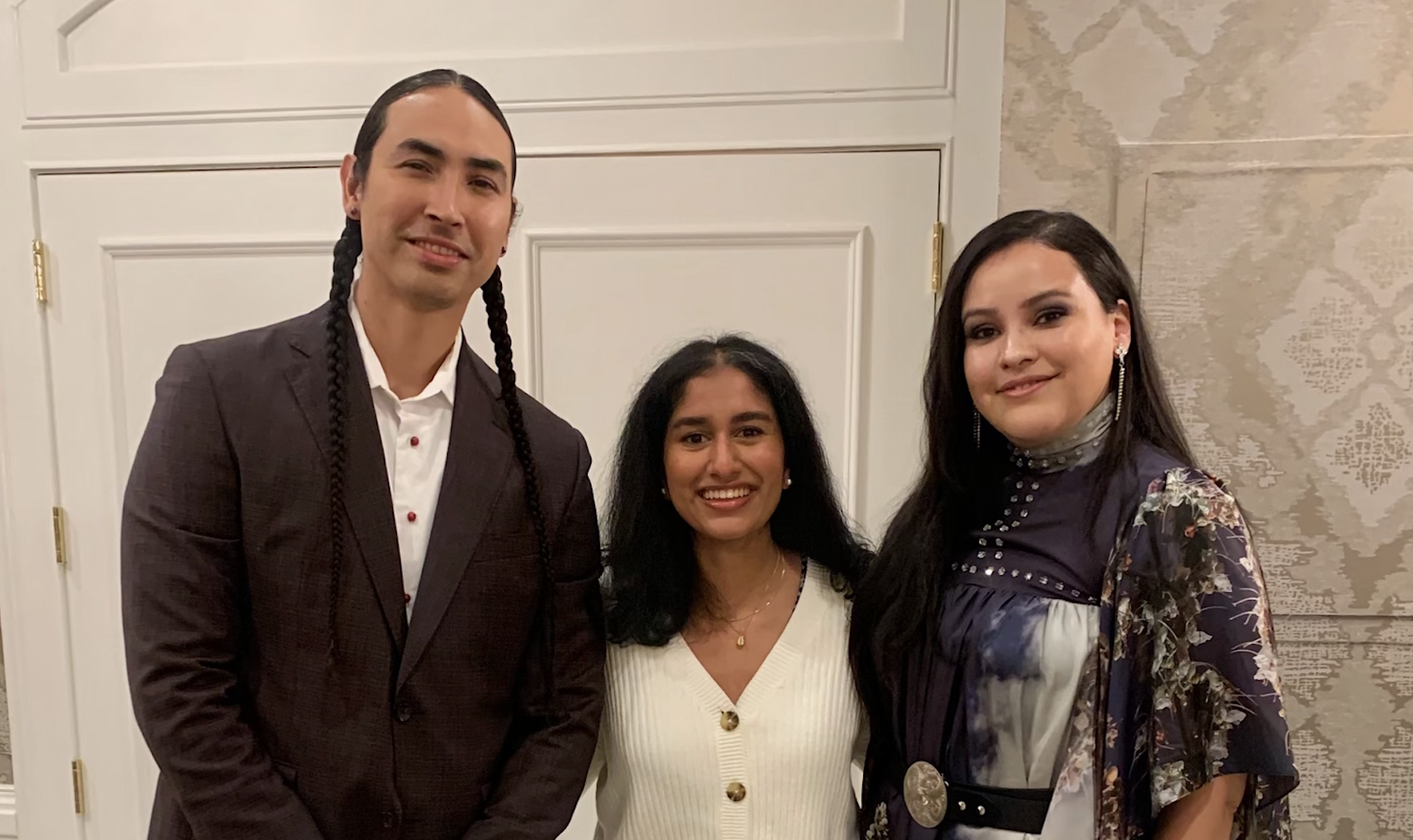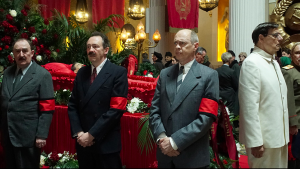It’s official: Oscars season is upon us. As critics, amateur cinephiles, and Chicken Shop Date fans alike eagerly anticipate Hollywood’s biggest night, one of the year’s most notable storylines has been Lily Gladstone making history as the first Native American to be nominated for best actress. Gladstone earned a nod for her masterful performance as Mollie Kyle—an Osage woman who nearly falls victim to a murderous plot designed to defraud her community of their government-owed oil money—in Martin Scorsese’s latest opus, the epic Killers of the Flower Moon (2023).
But Gladstone is not the only Indigenous talent who has been propelled to new heights through Killers. According to Janae Collins—who plays Reta, a sister of Gladstone’s character—Killers has been nothing short of a “career-maker” for much of the film’s extensive cast of Native actors. Ahead of the film’s sure-to-be huge night at the Oscars, the Voice spoke with Collins and Tatanka Means (who portrays an Osage undercover FBI agent in the movie’s fast-paced final act) about the production process, the public’s response to the film, and what the project means for Hollywood’s tight-knit community of Native actors.
From the outset, Means and Collins emphasized the importance of disseminating the woefully under-discussed history of the Osage community, sharing that their own knowledge of the events was extremely limited prior to Killers. Means admitted that it was only after hearing early murmurs of Scorsese’s interest in David Gann’s 2017 book Killers of the Flower Moon that he picked up a copy and educated himself on the atrocities that had been committed nearly a century earlier. “I’m Navajo, Lakota, Omaha, and Ihanktonwan Dakota. So we’re from different tribes, but we weren’t told about this, we didn’t learn about this in school, it wasn’t taught to us,” Means reflected.
Meanwhile, Collins, who is Crow and Dakota/Lakota, came to the project with slightly more background.“On my Crow side, it is talked about a little bit—not fully in the sense of what happened, but there was knowledge about it,” Collins explained. This awareness fueled her eagerness to be involved in the film. “When I connected those two dots, I was like, ‘Oh my God, I have to be a part of this somehow—I don’t know how, I don’t know when.’”
Collins’s sentiment was shared by her peers. “In our niche circle of Native actors, there’s always talk about projects and stuff, and when we heard about Killers of the Flower Moon, and especially with Marty [Scorsese] directing it, that was explosive news,” she said. “It caused a lot of interest in the sense of ‘who’s going to get these roles?’ and ‘have you auditioned?’—there was a lot of talk in our circles.”
Yet despite this urgency and enthusiasm (and even with the project’s massive budget and A-list talent), making the film was far from a linear process. First of all, Collins explained, COVID-19 interrupted pre-production, resulting in uncertainty among the cast about the film’s future. “We were in the middle of auditions when that happened—I had received notice that I got a callback for my character Reta, but then COVID happened, so it was, like, over a year before we heard anything,” she said. “That was the hardest year to wait, and I wasn’t even sure if it was going to still be greenlit after that. It was unprecedented times.”
However, this pause allowed for a crucial reframing of the story. “In the initial audition, it was completely different material because I think they had a completely different script at that time,” Means said. That earlier version hewed more closely to Gann’s novel, which used the Reign of Terror as a lens through which to explore the rise of the FBI in the 1920s. The final iteration of the film still traced the FBI’s efforts to crack the case and identify the murderers, but positioned that narrative as a secondary plotline. Instead, Killers shifted its focus to the story of Ernest Burkhart (Leonardo DiCaprio)—one of the perpetrators of the scheme—and his parasitic relationship with his Osage wife Mollie (Gladstone). For Means, the narrative overhaul was well worth it: “After seeing everything now, it’s like this was the story, this is the way it was meant to be, and this is the way that I’m happy that everything turned out.”
With the script ironed out, it was time for Collins, Means, and their castmates to get to work developing their characters. Collins described the many factors she took into account when honing her role as Reta, including the character’s interpersonal dynamics (“the birth order for the sisters, for example”) and the broader context of the Osage and the era (“we’re speaking of 100 years ago, and also, we’re speaking of a people that were the richest people per capita in the world at the time”).
This attention to detail translated well in the film, particularly in a scene in which Reta, Mollie, and their sisters are gossiping and teasing one another—all in the Osage language—at a post-church picnic. When asked about the process of learning to speak Osage, Collins shared that “it was something we took very, very, very serious, and it was hours a day that we would learn. Because it’s a hard language for some of us!” Luckily, Collins was armed with a natural advantage. “For myself, I didn’t feel like it was that hard because it’s a Siouan based language, so a lot of the words that the Osage speak, I can almost understand because it’s very similar to ours in Lakota/Dakota. So it was fun for me, honestly—some of my sisters, not so much,” she joked.
For Means, one of the most memorable aspects of the making of the film was the experience of working alongside some of the industry’s leading names. He highlighted the courtroom scene as an experience that was “pretty wild, just as an actor.” As Means recalled, “I was sitting next to Jesse Plemons, there’s John Lithgow right here, Brendan Fraser, Robert De Niro, Leo [DiCaprio] is on the stand, and Marty’s there, and the [Native] community was there, and the FBI guys were there—it was just a moment to take in, and I’ll remember it forever and take with me.”
As for the response to the film (from a standing ovation at Cannes to a slew of nominations including best picture at the Golden Globes and Oscars), Means described it as nothing short of “positively overwhelming.” He appreciated “lots of support within Indian country,” while Collins noted that “getting the reception that we have has been overwhelmingly amazing.”
The experience has not been without its challenges: both actors also highlighted the unique added pressure they have faced as Native actors. As Means explained, “It’s kind of tricky sometimes when you take on a project, because you become kind of representatives, right? And when things go good or bad, sometimes it falls on your shoulders or something, and then we get the blame.” Collins echoed this experience, adding that “it’s definitely difficult in some senses because it was a tragedy, and if there is any dissent, it does tend to fall on us. People will look at us for our responses and stuff.”
As the two actors look beyond Killers, they are excited about each of their upcoming projects. Means is set to start filming Ransom Canyon, a Netflix series which, in his words, “is about Texas and ranches and cowboys and that kind of thing—it’s kind of a modern-day Western.” He also just wrapped an A24 horror film, Opus, alongside the likes of Ayo Edebiri and John Malkovich. Meanwhile, Collins is coming off of a huge year—in addition to Killers, she concluded a role as a recurring character in FX’s Reservation Dogs, which aired its final season in 2023.
On the whole, Collins and Means are proud of their work and hope it can inspire both more films about Native Americans and more projects that feature Native actors. “This is great to be able to shine a light on our story and highlight our talent that we have,” Means said. He credited Scorsese and his team with taking the time to forge connections with the Osage community, expressing hope that “this sets precedent for other projects to build with the tribe that they’re dealing with.”
Watch Killers of the Flower Moon on Apple TV+, and be sure to tune into the Oscars on March 10 (follow @VoiceHalftime on X, formerly Twitter, for live updates!).





